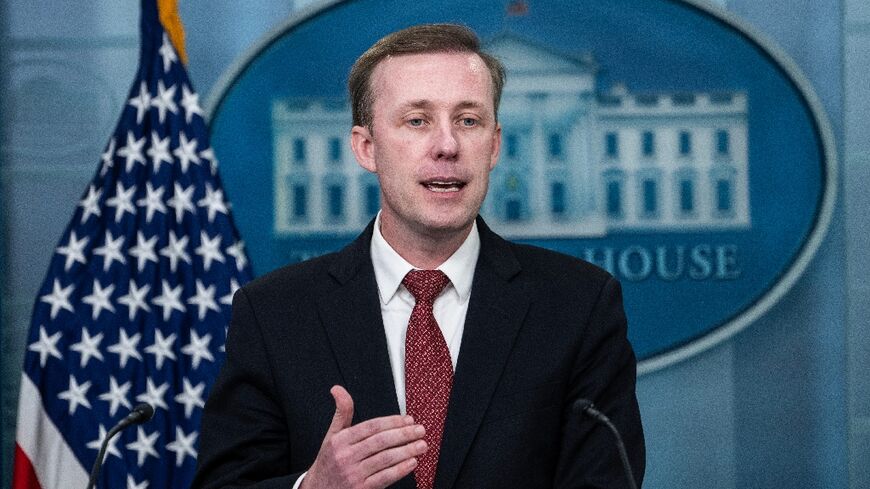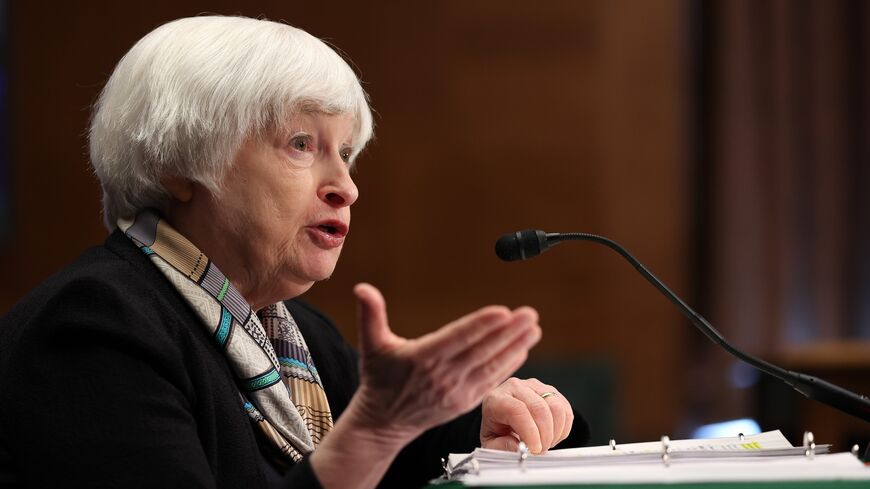'All options' on table as US readies fresh Iran sanctions after Israel attack
Treasury Secretary Janet Yellen said measures would be announced "in the coming days" and could including targeting illicit Iranian oil revenue.

WASHINGTON — The Biden administration will announce sanctions on Iran “in the coming days” in response to the country’s unprecedented aerial attack on Israel, the top Treasury official said Tuesday.
Treasury Secretary Janet Yellen told reporters Tuesday that the United States will use its sanctions tools, in coordination with allies, to “continue disrupting the Iranian regime’s malign and destabilizing activity.”
“I fully expect that we will take additional sanctions action against Iran in the coming days,” Yellen said. “All options to disrupt terrorist financing of Iran continue to be on the table."
Yellen’s comments came as Israel mulls a military response to Iran’s hourslong assault on Saturday night and Sunday morning, during which more than 300 drones and missiles were fired at the Jewish state from locations in Iran, Iraq, Syria and Yemen. Tehran said the barrage of projectiles, nearly all of which were intercepted, was retaliation for the deadly Israeli bombing of its embassy in the Syrian capital, Damascus, on April 1.
The Biden administration is seeking a coordinated diplomatic response to the attack, concerned that a forceful retaliation from Israel could set off a dangerous escalation in a region already on edge over its war against Hamas militants in Gaza.
German Foreign Minister Annalena Baerbock called Tuesday for the European Union to expand its existing sanctions regime targeting Iran’s drone and missile programs. EU foreign ministers were expected to explore possible sanctions during a video meeting on Tuesday.
Biden and the other Group of 7 leaders also spoke about imposing sanctions during their virtual meeting Sunday, and discussed some countries in the bloc designating Iran’s Islamic Revolutionary Guard Corps (IRGC) as a terrorist group, according to a senior administration official.
The Trump administration branded the IRGC as a foreign terrorist organization in 2019. Israel has urged the EU, the United Kingdom and other countries to do the same.
On Tuesday, Foreign Minister Israel Katz said he wrote to 32 countries urging them to blacklist the IRGC and impose sanctions on Iran’s missile program.
"Alongside the military response to the firing of the missiles and the UAVs, I am leading a diplomatic offensive against Iran," Katz wrote on the social platform X.
The Biden administration, which since taking office in 2021 has imposed more than 500 sanctions on targets connected to the Iranian regime and its proxies, is under pressure from Republicans to do more.
On Sunday, GOP Majority Leader Steve Scalise announced the US House of Representatives would consider a slew of Republican-sponsored bills this week aimed at holding Iran and its proxies accountable, including through new sanctions.
They include legislation that would rebrand Yemen’s Houthis as a “foreign terrorist organization” (FTO) three years after the Biden administration lifted the designation over concerns it was hindering aid distribution in the war-torn country.
In response to the Houthis’ attacks on Red Sea shipping, the administration in February returned the militants to the US list of “specially designated global terrorists” but stopped short of imposing the harsher FTO label.
The House overwhelmingly passed sanctions legislation Monday intended to curb Iran’s illicit exports to its biggest purchaser of crude oil, China. Republicans have accused the Biden administration of being slow to enforce oil sanctions, which they say has freed up funds for Iran to spend on financing attacks abroad.
“We have been working to diminish Iran’s ability to export oil. Clearly, Iran is continuing to export some oil,” Yellen said Tuesday. “There may be more that we could do.”





